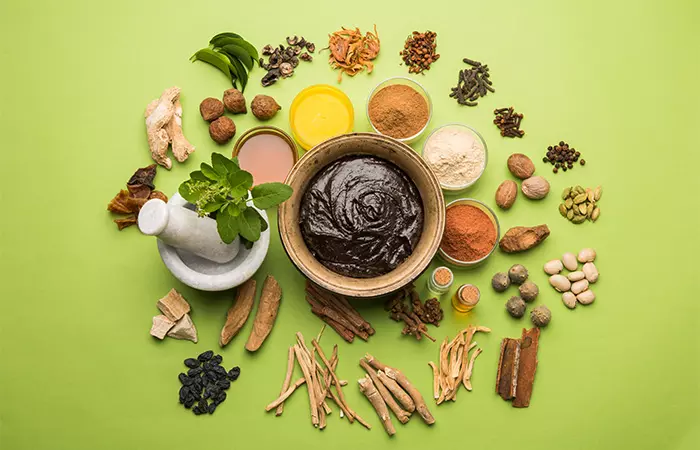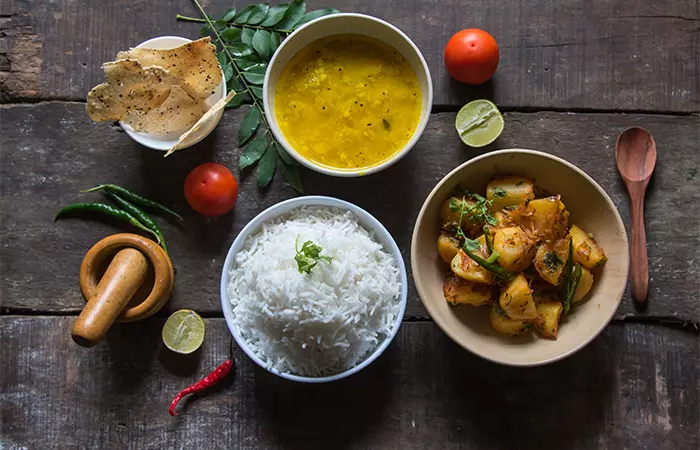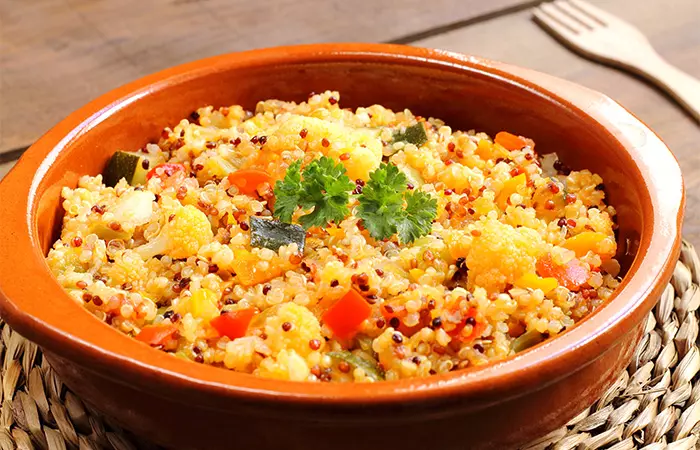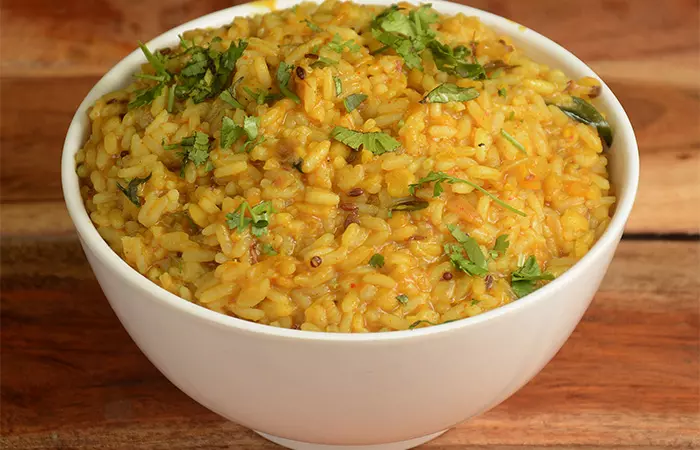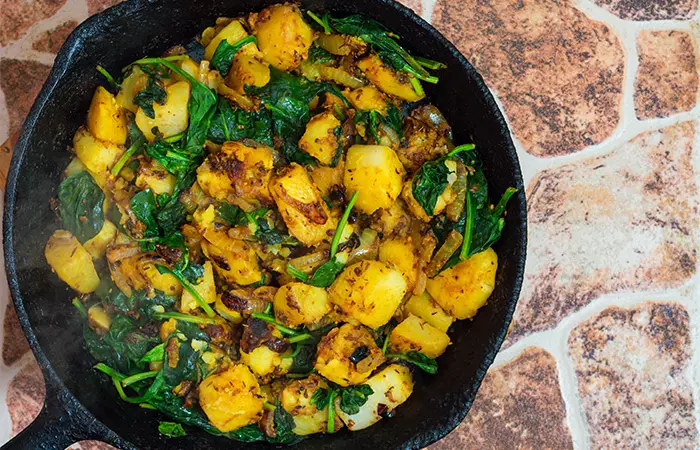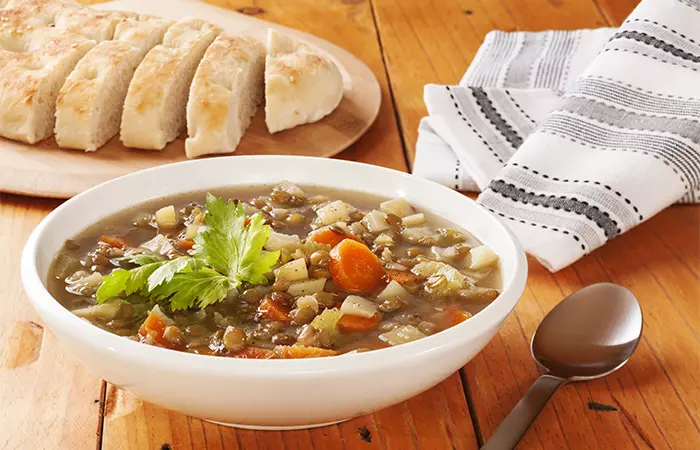The Ayurvedic diet is fundamentally based on the concept of the doshas or energies within a human body and achieving a balance between them. You are categorized into a specific body type based on these doshas and recommended certain food groups that will bring a healthy balance to your digestive system and overall health. Following this diet properly may cleanse and reset your digestive system and give you a chance to transform your overall health. Keep reading to learn more about the wonders of the Ayurvedic diet, its principles, pros, cons, and more.
What Is The Ayurvedic Diet?
It is an ancient dietary approach that forms part of the Ayurvedic lifestyle practiced for thousands of years in the Indian subcontinent. According to the Ayurvedic lifestyle and belief, the universe is made up of five elements: jala (water), vayu (air), teja (fire), akash (space), and prithivi (earth). These elements together form three types of energies, called doshas, that circulate in the bodies of all living beings. Each dosha has a designated location in the body and is responsible for certain associated physiological functions. The doshas are called pitta (fire + water), vata (air + space), and kapha (earth + water). Although all three doshas are present in the body, only one is said to be dominant in each individual, and it determines their body type. The Ayurvedic diet proposes consuming specific foods that are meant to bring about a balance between all the doshas and ensure the circulation of well-rounded energies within the body. Let us move on to the next section to understand how Ayurveda delves into these doshas to enable the attainment of centered energies through food.
How Does The Ayurvedic Diet Work?
From a broad perspective, the Ayurvedic diet encourages eating healthy, well-balanced meals. It works on the principle that the doshas determine an individual’s body type and should inform your food choices accordingly to achieve optimal health. It also provides guidelines on how your food must be prepared and when you should eat it. The main aspects of the Ayurvedic diet are the doshas, which are categorized as follows:
1. Vata Dosha
The Vata dosha is governed by the air and space elements. Individuals with Vata as their dominant dosha exhibit flexible behavior in their day-to-day lives. They are generally vibrant, highly creative, quick to speak, and have energetic expressions. They are also known to have frequently changing moods. Their body type is typically characterized by a delicate and lean build with fine hair and dry skin. They may be prone to conditions like fatigue, anxiety, and digestive issues when their energies are imbalanced.
2. Pitta Dosha
The Pitta dosha is guided by the fire and water elements. Those with a dominant Pitta dosha are known to make excellent leaders with an iron will and an intelligent and passionate disposition. They are said to be warm friends and fearsome opponents with a quick temper. They have a generally muscular and medium-built physique. An imbalance in their doshas may lead to indigestion, high blood pressure, or heart diseases.
3. Kapha Dosha
The Kapha dosha is commanded by the earth and water elements. Those with a dominant Kapha dosha are known to be laid back, easy-going, calm, conservative, and slow but purposeful individuals. Their bodies typically have a solid frame with thick bones. An imbalance in their energies may lead to issues like weight gain, diabetes, depression, or asthma. The Ayurvedic diet takes cues from these physical traits and conditions to recommend suitable eating habits for every individual. Going on this diet to address specific physical conditions or fitness goals will require a highly individualized plan. A professional Ayurvedic practitioner can assess your requirements, determine your dominant dosha, and help you come up with a customized diet plan. Alongside defining your dominant dosha, Ayurveda also prescribes certain principles or rules of eating that claim to offer overall health benefits when combined with mindful eating choices. Check out the next section to learn more about these principles.
Principles Of The Ayurvedic Diet
The Ayurvedic Diet has its foundation in the core principles of Ayurveda. They are as follows:
- Balancing The Doshas Every meal should help balance the three doshas – pitta, vata, and kapha – to ensure the harmony of all the energies circulating in the body.
- Balancing The Six Tastes In Ayurveda, foods are categorized into six tastes – sweet, salty, sour, bitter, pungent, and astringenti A type of taste that leaves a tingly and drying sensation in your mouth, such as that of green tea or persimmons. . A balanced Ayurvedic meal comprises all the tastes in appropriate proportions.
- Eating Seasonal Foods The diet also recommends eating locally grown seasonal foods to ensure that the body receives well-rounded nutrients throughout the year.
- Eating Fresh Whole Foods Ayurveda favors fresh, well-cooked whole foods. It discourages eating leftover, processed, or raw foods as they may be difficult for your body to break down.
- Choosing A Vegetarian Diet Ayurveda highly values fresh organic produce as they have a rich nutritional profile and may cleanse the body naturally. Many practitioners say it is okay to consume lean protein from chicken and fish in moderation as they are easier to digest.
- Enjoying Three Meals Per Day Ayurveda has a traditional approach to meal frequency, emphasizing three large meals as opposed to frequent small meals and snacks throughout the day. It claims this approach is the least burdensome for the digestive system. However, this claim is not backed by scientific evidence.
- Planning Big Lunch And Light Dinner Meals As Ayurveda equates digestion to the fire element, it suggests that the digestive fire is at its peak when the sun is at its highest in the afternoon. Big meals are best suited for stronger digestion at lunch, while a light, well-cooked meal three hours before bed is ideal for smooth digestion.
- Listening To Your Body This is Ayurveda’s version of portion control. It advises you to eat no more than your body is comfortable handling. A burp should be a sign enough to stop and avoid overeating an uncomfortable amount of food that can strain your gut.
- Using Spices And Herbs Wisely Ayurveda greatly treasures its medicinal herbs and spices. Meals infused with beneficial and flavorful spices and herbs are preferred in the Ayurvedic diet. You may also use herbal digestives if you encounter any trouble with digestion. But remember not to overdo them as it can end up irritating your stomach and intestines.
- Practicing Mindful Eating As the Ayurvedic way of eating is about mind and body harmony, it only makes sense to be present as you eat in a calm environment, savoring the flavors, and observing how it moves through your body. Try to stay away from digital or physical distractions and do not engage your mind in stressful thoughts when you eat. Alongside all these important principles is another basic rule of healthy eating practices, which is hydration. Whether it is herbal teas, milk, probiotics, clean juices, or even plain water, make sure you get lots of fluids in your system throughout the day to aid proper circulation, digestion, and balanced health. Now that we have learned what the Ayurvedic diet recommends us to do, let us understand why it does so. Keep reading to learn about the advantageous ways in which this diet may impact you.
Benefits Of The Ayurvedic Diet
Ayurveda has been an integral part of the lifestyle and culture in the Indian subcontinent. Since it holds such a revered place even in modern times, its impact on various aspects of life has been researched to a decent extent. Let us see what potential benefits this diet may offer.
- May Curb Toxic Food Cravings Food cravings, especially at odd hours, maybe a coping mechanism where one unknowingly reaches for unhealthy food for comfort. Ayurveda places importance on mindful eating and encourages solely focusing on the act of eating during your meals. Mindful eating habits may help curb the unhealthy habit of binging when in distress (1).
- May Aid Weight Loss If you need an Indian diet for weight loss, the Ayurvedic diet is a great choice. It emphasizes having three main meals a day (breakfast at 7-8 AM, lunch at 12-1 PM, and dinner at 6-7 PM) while avoiding mindless snacking. This focus on strict meal timings, restriction on snacking, mindful eating, and consumption of well-cooked whole foods may help reduce weight over time. Studies have shown that a special Ayurvedic diet therapy may help people with obesity manage their weight (2).
- May Lower The Risk Of Chronic Diseases The Ayurvedic diet discourages the consumption of processed food items. Studies have shown that eating ultra-processed foods increases the risk of chronic health conditions, such as coronary heart diseasei A condition relating to damage in the heart’s major blood vessels due to which oxygen-rich blood is not supplied to the heart. and cardiovascular diseasesi A general term for a group of disorders of the heart or blood vessels where blood flow to the heart, brain, or body is reduced. (3). By avoiding such food items, this diet may indirectly contribute to good heart health.
- May Improve Gut Microbiome Balance Ayurveda’s prized medicinal herbs are popularly recommended for good gut health. Its special digestive medicine, Triphala, made of bibhitaki (Terminalia bellerica), haritaki (Terminalia chebula), and amalaki (Emblicaofficinalis), is good for digestive health. It is said to have anti-inflammatory, antibacterial, antioxidant, hypoglycemici Relating to the condition where blood sugar levels are lower than 70mg/dL, which is the average healthy reading. , and adaptogenici Relating to herbs, roots, or other plant substances that support the body’s response to stress, anxiety, or fatigue. properties along with other benefits (4).
- May Relieve Symptoms Of IBS Ayurvedic diet’s principles, although vast, are relatively simpler to follow as opposed to complex diets that require a good understanding of diet and nutrition concepts. This simple aspect of the diet has shown a better drop in the severity score of IBSi Irritable Bowel Syndrome; a common gastrointestinal disorder characterized by bloating, abdominal pain, diarrhea, and constipation. symptoms compared to low-FODMAPi Fermentable oligosaccharides, disaccharides, monosaccharides, and polyols – carbohydrates that are hard to digest. diets (5). A shift to more traditional and simple eating habits, as proposed by the Ayurvedic Diet can have remarkable benefits for your health. All you have to do is be aware of your doshas and eat accordingly. Karin Littleton, a nutritionist and health coach, says, “Studies on Ayurvedic diet benefits for conditions like PCOS, highlight its potential advantages for weight loss, mindfulness, gut health, and providing digestive relief for IBS sufferers. However, it’s crucial to consult with healthcare professionals before making any dietary changes, especially for those with specific health concerns.” If you are new to this concept, the food lists given in the following section may give you a general idea of what you can and cannot eat.
Foods To Eat And Avoid On The Ayurvedic Diet
The following are lists of foods to eat and avoid for each dosha:
1. Vata Dosha Diet
Foods To Avoid
Fruits: Unripe and dried foods like raisins, dates, prunes, and light fruits like cranberries, pears, and pomegranates Vegetables: Raw vegetables, cooked cruciferous veggies, mushrooms, tomatoes, and potatoes Grains: Barley, rye, wheat, buckwheat, millet, corn, and quinoa Legumes: Beans Proteins: Red meat Herbs And Spices: Bitter herbs like coriander, thyme, and parsley
2. Pitta Dosha Diet
Foods To Avoid
Fruits: Unripe and sour fruits, like sour cherries, grapes, grapefruit, apricot, and papaya Vegetables: Onions, tomatoes, eggplant, chili peppers, and beets Grains: Rye, millet, corn, and brown rice Protein: Egg yolk, red meat, and seafood Dairy: Buttermilk, sour cream, and cheese Nuts And Seeds: Peanuts, pine nuts, pistachios, walnuts, almonds, cashew nuts, and sesame seeds Herbs And Spices: Any herbs and spices not included in the allowed list
3. Kapha Dosha Diet
Foods To Avoid
Fruits: Mango, banana, coconut, and fresh and ripe figs Vegetables: Tomatoes, cucumbers, zucchini, and sweet potatoes Grains: Cooked cereal, rice, and wheat Protein: Egg yolk, red meat, and shrimp Nuts And Seeds: Pine nuts, Brazil nuts, walnuts, cashew nuts, pecan nuts, and sesame seeds
The recommended foods for each dominant dosha are intended to compensate for what the body lacks. For instance, the fiery Pitta dosha may benefit from foods that have a cooling and calming effect, like cucumbers. The Vata dosha is light and dry and needs more grounding food like soups and olive oil while avoiding dry fruits and raw vegetables. The Kapha dosha denotes a heaviness that light foods like beans may counteract. The Ayurvedic diet strictly focuses on eating healthy, wholesome foods. Processed foods and ingredients, artificial sweeteners and flavors, and red meat consumption are restricted for all three doshas. Scroll down to the next section for a sample diet plan to get a general understanding of how you may incorporate these foods into your daily diet.
7-Day Ayurvedic Diet Meal Plan
As much as the Ayurvedic diet highlights timely, well-balanced, well-cooked, portion-controlled eating, its main objective is to eat according to your dosha. Therefore, a diet plan for each dosha may have different food items, although the concept remains the same. The following table demonstrates a general 7-day Ayurvedic Diet meal plan. You may add more food options in your diet plan as per your preference as long as they are balanced in nutrition and taste. Do note that the types of fruits, grains, vegetables, and other ingredients included in the diet have to align with the needs of your dosha. 1 handful of nuts and seeds 1 handful of nuts and seeds The best thing about the Ayurvedic diet is its simplicity that offers several health benefits. Let us look at some simple and nutritious recipes to try on the Ayurvedic diet that don’t take much time to prepare and also ensure your body feels full and pampered.
Ayurvedic Diet Recipes
As the Ayurvedic diet stresses including six different tastes in each meal, you may rest assured that your meals will be flavorful. Check out the recipes below and experiment with them, within your dosha’s recommendations, to enjoy your Ayurvedic diet experience.
1. Quinoa And Vegetable Stir-Fry
Ingredients
½ a cup of quinoa 1 cup of mixed vegetables ½ teaspoon of cumin seeds ½ teaspoon of fennel seeds ½ teaspoon of ginger paste ½ teaspoon of garam masala powder 1 tablespoon of ghee Salt to taste 1 sprig of fresh mint or coriander leaves for garnish
How To Prepare
2. Simple Khichdi
Ingredients
½ cup of plain or basmati rice ½ cup of lentils (yellow moong dal) 1 tablespoon of ghee ½ teaspoon of cumin seeds ½ teaspoon of mustard seeds ½ teaspoon of cumin powder ½ teaspoon of coriander powder ½ teaspoon of turmeric powder 1 pinch of asafoetida (optional) 2-3 cups of water Salt to taste 1 sprig of fresh mint or coriander leaves for garnish
How To Prepare
3. Potato And Spinach Curry
Ingredients
1 medium-sized potato, diced 1 cup of spinach leaves 1 tablespoon ghee ½ teaspoon cumin seeds ½ teaspoon cumin powder ½ teaspoon coriander powder ½ teaspoon turmeric powder ½ teaspoon garam masala powder Salt to taste 1 sprig of fresh coriander leaves for garnish
How To Prepare
4. Mixed Vegetable And Lentil Soup
Ingredients
1 cup of mixed vegetables ¼ cup of red lentils 1 tablespoon ghee ½ teaspoon of cumin powder ½ teaspoon of coriander powder ½ teaspoon of turmeric powder 2 cups of vegetable broth Salt to taste 1 sprig of fresh cilantro leaves for garnish
How To Prepare Play around with your choice of vegetables and enjoy a side of refreshing juice or probiotics for a wholesome meal. Remember to only make enough for one meal as this diet discourages eating leftovers. As we have established above, the Ayurvedic diet may play a role in aiding healthy weight management. However, you may be surprised to learn that the entire concept of Ayurveda is holistic and centered around creating a sound balance between mind, body, and spirit. Many Indian proponents and health and wellness enthusiasts swear by the healing, rejuvenating, and transformational powers of Ayurveda. Explore how the Ayurvedic way of life can be a potential treatment for weight loss in the next section.
Ayurvedic Treatment For Weight Loss
Ayurveda is often recommended as a healthy way of life with multiple health benefits, including boosted immunity and weight loss. Let us look at some of its principal factors that may help one achieve their weight loss goals.
- Encourages Eating Plant-Based Whole Foods Whole foods and organic produce, such as vegetables, fruits, and whole grains, are high-bulk, low-calorie, and nutrient-rich foods that keep you satiated (6). This, combined with the 3-meal-a-day rule, may help you maintain your weight.
- Stresses On Mindful, Portion-Controlled Eating Portion control is often recommended to individuals with obesity as it allows them to watch how much they are eating. This ensures you do not consume more energy than your body can burn and may contribute to weight loss (7 ).
- Offers Detoxification With Panchakarma Therapy If you want a good detox diet recommendation, the Ayurveda diet involves a detox plan – the Panchakarma therapy that you can try. It involves detoxification techniques and treatment methods for obesity, such as oleationi A pre-therapeutic procedure where an individual is externally or internally administered with any kind of oil or fat. , sudationi A therapeutic process in which an individual is made to sweat as a method of eliminating harmful toxins from the body. , and purgationi A therapeutic process of inducing bowel movement using a laxative to purify or cleanse the overall system. , that may help manage obesity-related disorders (8).
- Discourages Unhealthy Eating The Ayurvedic diet warns against eating processed or junk food, as well as carbonated drinks and alcoholic beverages that are unhealthy for the body. This aids weight management and overall health.
- Recommends Daily Exercising Getting daily exercise in the form of walking, jogging, yoga, or any kind of physical activity is highly recommended as part of the Ayurvedic lifestyle. This ensures your muscles and joints remain lubricated while you burn the calories that you do not need.
- Recommends Restful Sleep Ayurveda also heavily values the regeneration powers of a good night’s sleep. Healthy sleeping patterns have been found to have a positive impact on weight management (9).
- Encourages Engaging In Mindfulness Activities Mindful activities can help manage stress. Proper stress management can keep unhealthy eating habits at bay, thereby ensuring you eat healthy and balanced meals while keeping your weight in check. These factors easily complement the fundamental principle of eating according to your dosha that, by design, ensures you eat to make up for the lack of specific energies in your body. While the Ayurvedic diet boasts of its multifold merits, it has its own set of disadvantages like all other diets. Let’s take a look at them in the following section.
Drawbacks Of The Ayurvedic Diet
The biggest challenge with the Ayurvedic diet at the global level is that it is not well-regulated and, hence, it is not a concept that is easily accessible. Also, certain herbs and spices are not easily grown outside of the Indian subcontinent, which makes them expensive and also difficult to learn about in a safe manner. Here are a few more drawbacks of the Ayurvedic diet to consider before you decide on taking it up: All that said, if one can accommodate the Ayurvedic diet in their schedules, take the time to read about it, exercise patience in observing results, and diligently follow its rules, they may be able to experience its amazing benefits. However, do reach out to an expert if you are a beginner to ease into the ideology, and consult your doctor if you have any medical conditions that require a specific dietary approach. The Ayurvedic Diet offers a unique approach to healthy eating that involves identifying the insufficiencies in your energies and eating foods that compensate for them. It is based on the concept of the three doshas – Vata, Pitta, and Kapha – that are present in every human being, but only one of them is dominant, and you must eat according to its needs. This diet is highly individualized as it is based on your specific body type. However, research and proof of its efficiency is limited. Although the diet has its limitations, it has shown positive results with weight loss, mindfulness, and overall balanced health. It also recommends incorporating healthy lifestyle changes, such as sleeping and exercising alongside eating well-balanced meals. However, do consult your doctor if you have medical concerns that require dietary modifications to ensure safe dieting practices. What is the Ayurveda eating schedule? Many practitioners recommend a 3-meal-a-day eating schedule for the Ayurvedic diet, which involves adhering to strict timings. Typically breakfast is around 7-8 am, lunch is around 12-1 pm, and dinner is around 6-7 pm. What should I drink in the morning on the Ayurvedic diet? Depending on your dosha, you may enjoy a variety of drinks in the morning, such as herbal teas, lemon water, herbal infusion drinks, warm lemon water, or just a glass of plain warm water. What should we not eat at night in Ayurveda? Nighttime meals on the Ayurvedic diet should be the lightest meals of your day. This means you must avoid heavy, junk, fried, processed, sweetened, and non-vegetarian foods. These foods are not easy to digest, and you also do not have enough time to burn excessive energy from such foods. What is the gap between dinner and sleep in Ayurveda? The typically recommended gap between dinner and sleep is at least three hours as per Ayurveda.
Illustration: The Ayurvedic Diet: Principles Health Benefits & Recipes
The Ayurvedic Diet proposes eating nutrient-rich foods that balance all your energies. But what are these foods? Watch this video to learn about Ayurvedic superfoods, their benefits, and diet tips.
